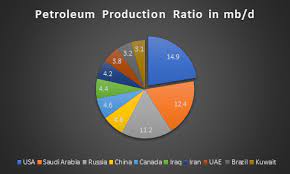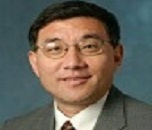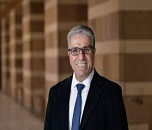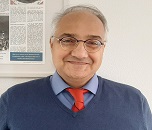
Petroleum Engineering - 2022
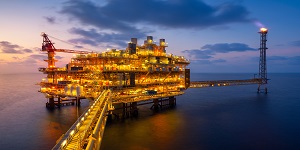
Theme: Demonstrating advancements in oil, gas and petroleum industry
3rd International Conference on Petroleum Engineering and Geoscience is delighted to welcome the participants from everywhere on the planet to attend the distinguished conference scheduled for December 12-13, 2022 in Dubai, UAE. The conference provides the global coliseum for international scholars to voice their analysis findings to the world. With representatives from all the key countries attending, the atmosphere is exciting with open and friendly interaction between attendees. The Theme of the Conference is Demonstrating Advancements in the Oil, Gas, and Petroleum Industry.
Petroleum Engineering 2022 brings together attendees and provides them with the opportunity to gain insights relating to the various aspects of the oil, gas, and Petroleum sector. It is providing a unique opportunity to see what’s new and build business connections with industry leaders. If you face challenges in getting your findings into paper, you will benefit from this event. The Conference will continue to address the opportunities and challenges in the energy industry, with a significant and renewed focus in 2022 on industry supply, local capability, the energy transition, hydrogen, subsea, and innovation.
Sessions 1: Advanced Drilling Technologies and Safety:
As demand for oil and its derivatives is growing, education, research, and technology are also swiftly developing to drive the oil and gas sector forward by developing new technical solutions, standards, and industry best practices. Drilling is a unique mechanical process that is designed to bring petroleum oil hydrocarbons to the surface by making a hole or bore into the earth’s surface. In geotechnical engineering, drilling fluid is used to aid the drilling of boreholes into the earth. Drilling rigs are used not only to identify geologic reservoirs but also to create holes that allow the extraction of oil or natural gas from those reservoirs. Traditionally oil and gas wells are vertically drilled. Technological advancements have allowed operators to save time, reduce operational costs, and lessen their environmental impact.
Keywords: Petroleum Engineering Conference | Oil and Petroleum Meetings | Petroleum Meetings | Petroleum Engineering Conferences | Petroleum Conferences| Petroleum Engineering Events.
Sessions 2: Advances in Oil Recovery and Refining Operations:
Refining is a process of converting crude oil into usable products. Crude oil is a mixture of hundreds of different types of hydrocarbons with carbon chains of different lengths. These can be separated through refining. The refining technics as follows: Physical separation through crude distillation, Conversion or upgrading of the basic distillation streams, Product treatment to purify and remove contaminants and pollutants, and Product blending to create products that comply with market specifications. Cracking: Cracking processes break down heavier hydrocarbon molecules (high boiling point oils) into lighter products such as petrol and diesel, using heat (thermal) or catalysts (catalytic). Enhancing Oil Recovery With Bottom Water Drainage Completion. Field tests with DWS well completions have shown that DWS can control water coning and increase the oil production rate.
Keywords: Petroleum Engineering Conference | Oil and Petroleum Meetings | Petroleum Meetings | Petroleum Engineering Conferences | Petroleum Conferences| Petroleum Engineering Events.
Sessions 3: Digital Transformation:
The Digital Transformation Initiative focuses at the Forum on the brand spanking new opportunities and themes arising from the latest developments within the digitalization of business and society. Digitalization's impact on Oil and Gas was considered across the value chain, from exploration and production to midstream, (refinery) and retail. Oil, Gas, and Petroleum industries are beginning to digitalize, focusing on better understanding a reservoir's resource and production potential, improving health and safety, and boosting marginal operational efficiencies at oil fields around the world. Digital asset life cycle management, Circular collaborative ecosystem, beyond the barrel, Energizing new energies.
Keywords: Petroleum Engineering Conference | Oil and Petroleum Meetings | Petroleum Meetings | Petroleum Engineering Conferences | Petroleum Conferences| Petroleum Engineering Events.
Sessions 4: Petroleum Refinery:
An oil refinery or petroleum refinery is an industrial process plant where crude oil is transformed and refined into useful products such as petroleum naphtha, gasoline, diesel fuel, asphalt base, heating oil, kerosene, liquefied petroleum gas, jet fuel, and fuel oils. Petrochemical feedstock like ethylene and propylene can also be produced directly by cracking crude oil without the need of using refined products of crude oil such as naphtha. The crude oil feedstock has typically been processed by an oil production plant. Oil refineries are typically large, sprawling industrial complexes with extensive piping running throughout, carrying streams of fluids between large chemical processing units, such as distillation columns.
Keywords: Petroleum Engineering Conference | Oil and Petroleum Meetings | Petroleum Meetings | Petroleum Engineering Conferences | Petroleum Conferences| Petroleum Engineering Events.
Sessions 5: Pipelines and Transportation:
Pipeline transport is the transportation of goods through a pipe. Liquids and gases are transferred in pipes and any chemically stable substance can be sent all through a pipeline. Pipes exist for the transport of crude and refined petroleum, fuels - such as oil, natural gas, and biofuels - and other fluids including sewage, slurry, water, and beer. Pipelines are suitable for carrying water for imbibing or irrigation over long distances when it wants to move over hills, or where canals or channels are poor choices due to considerations of dehydration, pollution, or environmental impact.
Keywords: Petroleum Engineering Conference | Oil and Petroleum Meetings | Petroleum Meetings | Petroleum Engineering Conferences | Petroleum Conferences| Petroleum Engineering Events.
Sessions 6: Fuels and Refining:
For the foremost half, rough oil is warm and adjusted into a gas. The hot gases area unit passed into the bottom of a refining section and become cooler as they climb the tallness of the segment. Because the gases cool beneath their brink, they gather into a fluid. The fluids area unit is then drawn off the refining section at express statures, running from overwhelming dwells at the base, crude diesel energizes within the midriff, and crude gas at the top. These crude divisions’ area units are then ready to create a number of various completed things. Albeit all parts of oil discovery utilizes, the best request is for gas. One barrel of rough oil contains just 30-40% fuel. Transportation requests require that over half of the unrefined petroleum be "changed over" into gas.
Keywords: Petroleum Engineering Conference | Oil and Petroleum Meetings | Petroleum Meetings | Petroleum Engineering Conferences | Petroleum Conferences| Petroleum Engineering Events.
Sessions 7: Advanced Oil and Gas Technologies:
Oil and gas are naturally occurring chemicals that are made up of just two elements Hydrogen and Carbon. Nowadays Oil and natural gas reserves are found in many parts of the world. In the past, demand was low, and reserves were easy to find. In fact, the first users of oil depended on surface oil excretion for their supplies. However, as demand has increased, all easily found oils have been used. Today, oil exploration takes place in some of the most challenging places on earth. Now all are surveying for new oil reserves thousands of feet under the ocean and lands. This session explains Hydrocarbons and Hydrocarbon reservoirs, the formation of Oil and Natural Gas, the refining of crude oil and its restoration, pipelines for refined oils, and natural gas exploration and production.
Keywords: Petroleum Engineering Conference | Oil and Petroleum Meetings | Petroleum Meetings | Petroleum Engineering Conferences | Petroleum Conferences| Petroleum Engineering Events.
Sessions 8: Global Crisis and Major Challenges in Oil:
Petroleum Economics has a vibrant role to play in the oil & gas industry and it lies at the center of all decision-making. Various methods have evolved over time in determining and calculating economic inputs, evaluating investments, quantifying risk, and generating feasible portfolios. Petroleum economics brings together information and expertise across the E&P spectrum and a clear understanding of concepts such as cash flow analysis, organizational challenges, price forecasting, cost drivers, and risk management is required. The Petroleum Engineering 2019 wants to bring together a wide industry audience including practitioners of economics and decision-making.
Keywords: Petroleum Engineering Conference | Oil and Petroleum Meetings | Petroleum Meetings | Petroleum Engineering Conferences | Petroleum Conferences| Petroleum Engineering Events.
Sessions 9: Impacts of Oil and Gas on Petroleum Industries:
Hydrocarbons are a class of mixes basically made out of carbon and hydrogen, and they are significant segments of the oil and common gas. These substances add to the nursery impact and a worldwide temperature alteration, drain the ozone, increment events of growth and respiratory issue, diminish the photosynthetic capacity of plants, and, in the infamous type of oil slicks, do untold harm to biological systems. Enormous oil slicks are a conspicuous wellspring of harm to biological systems and human wellbeing, obstructing pores, restraining respiratory capacities, and harming creatures that ingest them. Oil is not just unfavorable in vast spills; little emanations from car spills and different sources can have total impacts that can be exceptionally harmful to the earth.
Keywords: Petroleum Engineering Conference | Oil and Petroleum Meetings | Petroleum Meetings | Petroleum Engineering Conferences | Petroleum Conferences| Petroleum Engineering Events.
The dynamics of engineering labor markets are controversial. Some believe they are similar to other labor markets, in which the supply of workers is responsive to demand as reflected in salaries. As the demand for engineers increases, salaries increase, motivating more students to major in engineering and more incumbents to stay in engineering. Others assert that the specialized knowledge and arduous education and training required of engineers inherently limit the size of the labor pool. According to this view, the U.S. education system does not produce a sufficient number of qualified engineers to meet national needs. One problem is said to be a lack of interest in the profession of engineering by American young people, especially women and some minorities. Another is a supposed weakness in the U.S. K-12 education system which, it is claimed, does not produce a sufficient number of high school graduates qualified to enter university engineering programs. Petroleum engineering provides an illustrative case study for assessing the dynamics of engineering labor markets more generally. Petroleum engineering is a field where concerns about shortages of talent have been strongly voiced by industry leaders for a number of years, first prompted by observations over the past decade of labor force demographics indicating a need for increased hiring The anticipated wave of retirements in the industry, in a workforce where half of all geophysicists and engineers are expected to retire by 2018, is characterized by people in the oil and gas industry as “the great crew change.” In recent years the demand for replacement hiring was further compounded by increased exploration that requires hiring additional petroleum engineers. The history of petroleum engineering demand reflects the cyclical demand for engineers in response to changes in the industry.
The building of the Trans-Alaska Pipeline and increased oil exploration in other regions had led to rapidly increasing demand for petroleum engineers in the 1970s. But once the pipeline was built and new domestic oil exploration slowed, demand for new petroleum engineering graduates fell off. However, by the late 1990s many of the Trans-Alaska Pipeline generation engineers were approaching retirement age and, most recently, more of the workforce passed retirement age just as spikes in oil prices were leading to an anticipated increase in need for petroleum engineers as firms were motivated to explore more aggressively for new oil fields. In this chapter we first examine the recent history of claims that the market for engineers is dysfunctional. We then investigate the adjustment of the supply of engineering graduates to meet sharp increases in demand for petroleum engineers, and the implications for other areas of engineering and for the supply and demand of science and engineering (S&E) personnel. This investigation begins with a description of the field of petroleum engineering. We describe the field of petroleum engineering and supply responses to the market signals of the late 1990s and early 2000s. We then discuss the mechanisms that signaled an upcoming demand spike to universities and other institutions, and the responses that allowed those institutions to meet the demand. We conclude with the implications of this case for the shortage and mismatch claims made about the S&E workforce. Shortage and Mismatch Claims Following the Great Recession of 2008, a group of technology company CEOs and others on the President’s Council on Jobs and Competitiveness called for special measures by government, business, and universities to increase the number of U.S. engineering graduates by 10,000 a year. The Institute for Electrical and Electronics Engineering President Ron Jensen supported this call, asserting that more engineering graduates are needed because engineers drive innovation and create jobs. Companies cited a shortage of engineers as the reason they have “had” to move work offshore. CBS News featured Andrew Liveris, president of Dow Chemical, lamenting the scarcity of qualified engineers in the United States, saying this had caused his company to open research and development labs in Brazil, China, India, and Eastern Europe instead of the United States. And famously in 2011, Steve Jobs told President Obama that the reason he located 700,000 manufacturing jobs in China instead of the United States was his inability to find enough industrial engineers in the United States (Issacson 2011). These calls for government to increase the number of engineering graduates follow a decade-long series of reports and policy statements decrying shortages of science and engineering graduates.
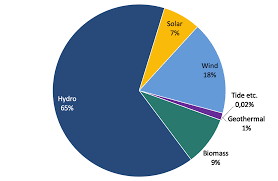
Some claim that persistent high rates of unemployment in the wake of the economic crisis that started in 2008 were caused by a mismatch between the skills of the unemployed and the skill needs of the new economy. Rapidly advancing technology implies that the skill needs of the “new” economy are primarily in the area of S&E human resources. These claims are compounded by the fear that the United States is losing (or will soon be losing) a technological race with other countries. This fear is supported by statistics showing that China and India produce hundreds of thousands of engineers. United States is losing technological competitiveness because of weaknesses in our K-12 math and science education system. One alleged consequence of this weakness is a shortage of Americans well enough educated to succeed in university engineering programs. These concerns have motivated proposals for heavy investments to remedy the weaknesses in the United States’ K-12 math and science education system, make engineering as a career seem more attractive to young people (especially women and minorities who are underrepresented in engineering), offer more scholarships to engineering students, and expand university engineering programs. These primary and secondary educational reforms are typically complemented by proposals to bring in larger numbers of talented foreign engineers while retaining more of those who are already here at our universities and in our high-tech workforce. The purported need to increase the number of engineering graduates available in the United States for employers is based on a number of assumptions. It is assumed that there is indeed a shortage of engineers that cannot be met by the normal functioning of labor markets. Furthermore it is assumed that the size of the stock of engineers in a country is proportional to the country’s economic and military security, or even that to be secure a country must have more engineers than its rivals. Still another assumption is that increasing the supply of engineers, regardless of the demand expressed in the market place, will increase innovation and in turn drive economic growth. Still more assumptions underlie the proposals to fix the supposed shortage problem, such as the notion that part of the claimed shortage of engineering graduates is caused by the failure of American schools to train K-12 students so that they are qualified to enter university engineering departments and this failure is exacerbated by a failure to convince
Meetings International is announcing Young Scientist Awards through “International Conference on Petroleum Engineering” (Petroleum 2022) which is scheduled at Amsterdam, Netherlands during May 18-19, 2022. This Petroleum 2022 focuses on “Demonstrating advancements in oil, gas and petroleum industry”. Petroleum 2022 and upcoming conferences will recognize participants who have significantly added value to the scientific community of medical and nursing field and provide them outstanding Young Scientist Awards. The Young Scientist Award will provide a strong professional development opportunity for young researches by meeting experts to exchange and share their experiences at our international conferences. Petroleum 2022 aims on the level of thought that individual patients need at various centres in their course. Petroleum guidelines are generally perceived as best practice for an inexorably normal nearness in the Chemical composition. Oil and Gas conference organizing committee conference is providing a platform for all the budding young researchers, young investigators, post-graduate/Master students, PhD. students and trainees to showcase their research and innovation. Eligibility:
Young Scientists, faculty members, post-doctoral fellows, PhD scholars and bright Final Year MSc and M.Phil. Candidates. Persons from Scientific Industry can also participate. Benefits:
The Young Scientist Feature is a platform to promote young researchers in their respective area by giving them a chance to present their achievements and future perspectives.
- Acknowledgement as YRF Awardee
- Promotion on the conference website, Young Researcher Awards and certificates
- Link on the conference website
- Recognition on Meetings Int. Award Page
- Chances to coordinate with partners around the world
- Research work can be published in the relevant journal without any publication fee.
Criteria:
- All presented abstracts will automatically be considered for the Award.
- All the presentation will be evaluated in the conference venue
- All the awards will be selected by the judges of the award category
- The winners of the Young Scientist Award will receive award certificate.
The awards will be assessed as far as plan and format, intelligence, argumentation and approach, familiarity with past work, engaging quality, message and primary concerns, parity of content visuals, and by and large impression. Guidelines:
All submissions must be in English.
- The topic must fit into scientific sessions of the conference
- Each individual participant is allowed to submit maximum 2 papers
- Abstract must be submitted online as per the given abstract template
- Abstracts must be written in Times New Roman and font size will be 12
- Abstract must contain title, name, affiliation, country, speakers biography, recent photograph, image and reference.
Conditions of Acceptance:
To receive the award, the awardee must submit the presentation for which the award is given, for publication at the website, along with author permission. Failure to submit the PPT and permission within the designated timeframe will result in forfeiture of award. Award Announcements:
Official announcement of the recipients will occur after the completion of Petroleum Engineering Conference.
- Advanced Drilling Technologies and Safety
- Advances in Oil Recovery and Refining Operations
- Digital Transformation
- Petroleum refinery
- Pipelines and Transportation
- Fuels and Refining
- Advanced Oil and Gas Technologies
- Global Crisis and Major Challenges in Oil
- Impacts of Oil and Gas On Petroleum Industries
- Oil & Gas Research
- Journal of Advanced Chemical Engineering
1 Organizing Committee Members
5 Renowned Speakers
Yunping Xi
University Of Colorado,
United States of America
Abdelaziz Khlaifat
American University
United States of America
Joni Graham
Revelation Energy Solutions
United States of America
Dr. Reza Javaherdashti
Eninco Engineering B. V
Netherlands
Mohamedreza Hamedghafarian
Senior Process Engineer
Iran

